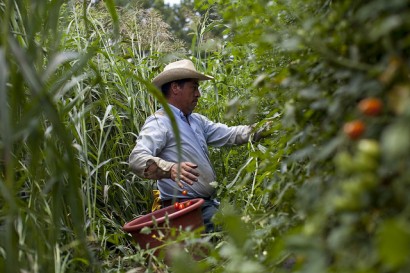- La Feria Community Holds Succesful Business Mixer Event
- Little Nashville to Take Place in Downtown Mercedes
- Lions Basketball Captures District Gold
- La Feria ISD Students Compete in Regional Chess Tournament
- Lions End First Half of 32-4A on a High Note
- La Feria ISD Held Another Successful Parent Conference
- Strong Appearance for Lions at Hidalgo Power Meet
- LFECHS Students Get to Meet Local Actress
- Students Participate in Marine Biology Camp
- Two LFECHS Students Qualify for All-State Band
Research: Few Benefits for Workers with Temporary Visas
- Updated: September 11, 2014
by John Michaelson/TNS
AUSTIN, Texas – Immigrants from Mexico can fill the gap where there’s a need for agricultural or low-skilled work in Texas and other states. However, a new study finds little benefit for those who legally obtain a temporary worker visa.
Indiana University researcher Lauren Apgar found that temporary workers hold jobs with the lowest occupational standing, and with wages equivalent to those of undocumented workers. Their visa requires that they work for the sponsoring employer, which she said prevents advancement.
“Overall, this is really suggesting that temporary workers experience some of the poorest employment outcomes, mainly because they cannot experience job mobility,” she said, “and then, they are limited in their wages.”
Apgar said one solution would be to reform the temporary workers’ program so that visas are issued directly to workers instead of employers. She said this would make the program more attractive to currently undocumented immigrants.

New research finds that most temporary workers from Mexico who get work visas are no better off than those who are undocumented. Photo credit: Bread for the World/Flickr.
Apgar said changing the visa stipulations also could increase protections for temporary workers.
“By not being tied to their employer,” she said, “workers would not fear losing their visa if they needed to report labor abuses or violations – in terms of being paid a lower wage, for example.”
The research found that most temporary work permits issued to Mexican nationals are “H-2” visas, for agricultural or non-agricultural, low-skilled work. Apgar said that while her research found changes are needed, the temporary-worker program is still important given the historical migration to the United States from Mexico.
“It is fulfilling a need, both in terms of jobs here in the U.S. that need to be filled and for Mexicans that need work,” she said. “However, without these protections in place, it really worsens labor market conditions for all workers in these types of jobs.”
According to the research, more than 100,000 additional H-2 visas were offered to workers from Mexico in 2013 than in 1987.
More information on Apgar’s research is online at news.indiana.edu.



One Comment